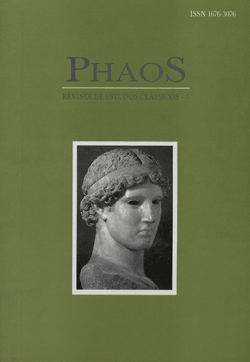La construcción del monstruo político en la Oratio in Catilinam prima.
Palavras-chave:
Foucault. Catilina. Political monster.Resumo
This paper will explore the First Catilinarian under Foucault’s discourse analysis theory. We assume that the context of political disruption triggers an identity crisis where it is essential to present Catilina as a complete “other” regarding what Rome has been and should be. Furthermore, we argue that this text shows certain regularities that enable an interpretation of Catilina’s otherness in monstrous terms, which entails the necessity of excluding him from the city.Referências
L Ediciones
AUSTIN, R.G. (1988). M. Tulli Ciceronis Pro M. Caeiio Oratio. Oxford: Oxford University.
CLARK, A. (1991). Phiiippicae I-XIV, Oxford.
MAYOR,].E.B. (1966). Thirteen Satires ofJuvenai. Hildesheim: G. Olms.
REYN O LDS, L.D. (1991). C. Sallusti Crispi: Catilina, Iugw·tha, Historialllm Fragmenta Selecta, Appendix Sallustiana. Oxford: Clarendon Press.
SHACKLETON BAILEY, D.R. (1965-1970). Epistuiae ad Atticum, c. comm. & transl., 7 vol., Cambridge.
WILKINS, A.S. (1887). The Orations ofCicero against Catilina. London.
2. Diccionarios
ERNOUT, A. - MEILLET, A. (1959). Dictionnaire étymoiogique de ia iangue iatine. Histoire des mots. Paris: K.lincksieck.
LEWIS, Ch. T. and SHORT, Ch. (1998). Latin Dictionary. Oxford: Clarendon Press.
ROBERTS,]. (2007). The Oxford Dictionary ofthe Ciassicai Worid. New York: Oxford University Press.
3. Estudios
BARTHES, R. (1982). Investigaciones Retóricas 1. La antigua retórica. Ayudamemoria. Buenos Aires: Ediciones Buenos Aires.
BATSTONE, W.W. (1994). "Cicero's Construction ofConsular Ethos in the First Catilinarian", Transactions of the American Phiioiogicai Association 24, 211-266.
BLOCH, R. (1968). Los prodigios en ia antigüedad clásica. Buenos Aires: Paidós.
CAPE, R.WJr. (1995). "The Rhetoric ofPolitics in Cicero's Fourth Catilinarian", The American Journai of Phiioiogy, Vol. 116, No.2, pp. 255-277.
CASTRO, E. (2004). EI vocabuiario de Michel Foucault. Un recorrido alfabético por sus temas, conceptos y autores. Buenos Aires: Universidad Nacional de Quilmes.
CORBEILL, A. (2002). "Ciceronian Invective", en MAY,j.M. (ed.). Brill's Companion to Cicero Oratory and Rhetoric. Leiden: Brill.
DIAZ-BONE, R., BUHRMANN, A.D., GUTIÉRREZ RODRÍGUEZ, E., SCHNEIDER, w., KENDALL, G. & TIRADO, F. (2007). "The Field ofFoucaultian Discourse Analysis: Structures, Developments and Perspectives", Forum: Qualitative Social Research, Vol. 8, W 2, p. 1-26.
EDWARDS, C. (1993). The Politics ofImmorality in AncientRome. Cambridge: Cambridge University Press.
FOUCAULT, M. (1970). La arqueologia deI saber. Buenos Aires: Siglo XXI. ___ o (1997). Elorden deI discurso. Barcelona: Tusquets.
FOUCAULT, M. (?OOO). Losanormales. Bs. As.: F.C.E.
FREDRlCK, D. (ed.) (2002). The Roman Gaze. Vision, Power, and the Body. Baltimore: The John Hopkins University Press.
HABINEK, T. (1998). "Cicero and the bandits", en The Politics ofLatin Literature. Writing, Identity, and Empire in Ancient Rome. New Jersey: Princeton University Press, 69-87.
HELLEGOUARC'H,j. (1972). Le vocabulaire latin des relations et des partis poli tiques sous Ia république. Paris: Les Belles Lettres.
JAL, P. (1963). "Hostis (publicus) dans Ia littérature latine", en Revue des Études Anciennes, XV, 53-79.
KONSTAN, D. (1993). "Rhetoric and the Crisis ofLegitimacy in Cicero's Catilinarian Orations", en T. Poulakos (eci.), Rethinking the History ofRhetoric: Multidisciplinary Essays on the Rhetorical Tradition, Boulder: Westview Press, 11-30.
LÓPEZ GREGO RIS, R. (2000), "La locura en Roma: Un léxico como recurso literario y argumento político", Myrtia, N° 15, pp. 205-226.
MONTERO DÍAZ, S. (1988). "Lajuventud romana en torno a Catilina", en Estudios de Historia Antigua y Medieval. Madrid: Editorial de Ia Universidad Complutense.
PAGÁN, V. E. (2005). Conspiracy Narratives in Roman History. Austin: University ofTexas Press.
PINA POLO, F. (1991). "Cicerón contra Clodio: ellenguaje de Ia invectiva", en Gerión 9,131-150.
Downloads
Publicado
Edição
Seção
Licença
Ao se submeterem textos para a PhaoS, seus autores devem estar cientes de que, se aprovados para publicação, a revista terá sobre eles todos os direitos autorais pertinentes. Originais não serão devolvidos.

